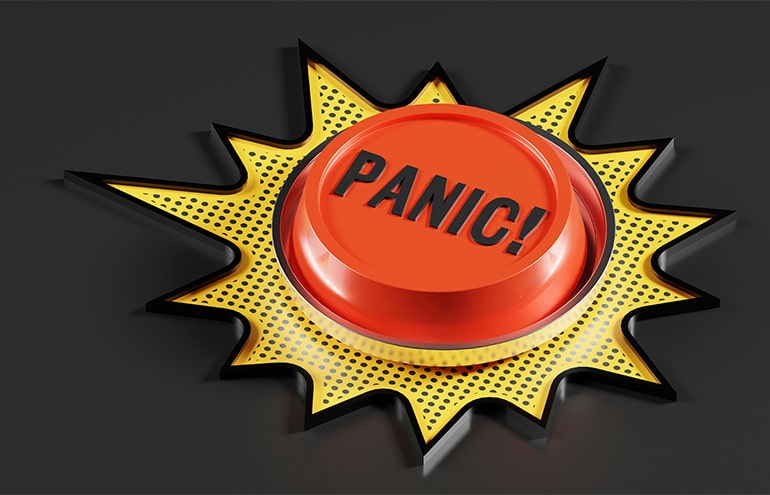Most U.S. companies lack a formal crisis communications plan, and your law firm is most likely among them. We asked two veteran law firm crisis communications consultants for advice on the situations firms should expect in 2025 — and the smartest way to prep for potential crises.

Table of contents
Law Firm Crisis Communications Must-Knows: The Experts Explain
Attorneys often play a pivotal role in crisis response for clients, yet many law firms neglect to plan for their own contingencies. And while your firm may not be the subject of a Trump administration executive order, the potential for high-stress, low-trust situations abounds — not just through client work, but through your firm’s operations. Up to 40% of law firms, for example, have been the target of a data breach.
You can’t control whether a crisis occurs, but you can plan how you respond to it. And because you do not deal with crises every day (we hope), there’s considerable value in engaging an experienced crisis communicator before a crisis occurs to help you anticipate issues, respond to them appropriately, and minimize the fallout.
We asked two veteran crisis communications consultants, Elizabeth Lampert and Amy Jordan Wooden, to address what lawyers should look for in such a consultant, how to prepare for the unexpected, and what types of situations law firms should anticipate in 2025.
Is it a Crisis or a Situation?
How would you define a “crisis”? What are the tripwires for lawyers or law firms to seek expert counsel?
Lampert: A crisis is any event, anticipated or unexpected, that threatens a law firm’s operations, reputation or client trust. This can include partner misconduct, data breaches, public client matters and political fallout. The key question is, does this situation have the potential for significant reputational or legal harm if not managed swiftly and strategically? Often, people have a situation, not a crisis.
Jordan Wooden: I think a crisis is any situation that has the potential to negatively affect the business/organization/entity. Sometimes a crisis is unexpected, and sometimes it is fully expected but avoidable. But how a crisis is handled makes all the difference in the world.
In a time of crisis, the inclination is often to “hunker down,” and an outside advisor can help guide the law firm away from that mentality and navigate the communications of the crisis.
What should law firms look for in a crisis communications specialist?
Jordan Wooden: Marketing and crisis are two ends of the communications spectrum! I often joke that if I had to sell laundry detergent, I wouldn’t know the first thing to do. But if someone swallows laundry detergent and dies, I’m your gal. I think it is important to look for 1) experience in crisis (how many years, is it the bulk of their business) and 2) subject matter understanding.
Lampert: Law firms need someone experienced in this specific work. A professional who understands legal privilege and litigation sensitivity — someone who knows how to collaborate with your internal team to protect reputations while respecting legal strategy. Look for a professional with legal industry experience, relevant sector experience, media training tailored to attorneys, and familiarity with law firm hierarchies and risk tolerance.
Practicing for a Crisis
You speak of the importance of tabletop exercises. What do these look like for those new to crisis prep?
Lampert: A tabletop exercise is a structured simulation of a crisis designed to test a firm’s response protocols. It usually starts with a fictional but realistic crisis scenario that is then revealed to a designated team (legal, PR, IT, HR, leadership) who react to the situation in real time. The group role-plays a variety of media inquiries, client questions and internal stakeholder reactions.
Jordan Wooden: To quote Allen Iverson, “We’re talkin’ about practice?!?” Yes, Allen, we are. A tabletop exercise is simply that — practicing for a crisis. Doing a tabletop exercise will test every aspect of a potential crisis scenario, including external and internal communications, in a low-risk environment.
You definitely do not want a managing partner to do an interview with news media regarding a crisis without practice. Ensuring your spokespeople have crisis communications media training, especially as part of a tabletop exercise, is the best way to prepare for potential crises.
Lampert: I always suggest someone take notes or the event be taped. This preparation method helps to bring some confidence when you find yourself in the situation being discussed and also identifies areas for improvement. The debrief session afterward … is particularly valuable for uncovering blind spots and preparing your team for a real crisis.
What scenarios should law firms prepare for in tabletop exercises?
Lampert: Law firms should prepare for common issues like cyberattacks, public allegations of harassment or discrimination, partner or associate misconduct, and disruptions from mergers, layoffs or leadership changes. Recent events also highlight the importance of preparing for weather, fires, and catastrophic environmental disruptions, including communication with staff and clients and data recovery. Tabletops should be thoughtful of response timing, message consistency, and clarity of the chain of command.
Jordan Wooden: Regardless of the scenario, a good tabletop exercise will include a few curveballs — something you would not expect or is part of the crisis plan on the shelf. For instance, I would definitely include a leak to the media as a curveball. It is pretty easy to get information to a reporter, and long gone are the days when every reporter would ensure they have confirmed two named sources before reporting the information. We live in “an unnamed source close to the situation but not authorized to speak on the matter” world now. Given the scenario, you could also include an “influencer” weighing in on their social media channel that makes the situation a lot worse.
Keep Calm and Trust the Process
What’s your best piece of advice for staying calm in a crisis?
Jordan Wooden: Remember what you can and cannot control. Also, never forget who your audiences are and identify the most important messages you want to convey. Although in a crisis you have to move in parallel tracks, thinking about those basic communications can help create a familiarity that, hopefully, translates to calm.
Lampert: Take a breath, assess the facts, and align with counsel before making significant moves or statements. Assuming tabletops have been conducted and plans are in place, trust the process. In my experience, not every situation requires an immediate public response, but every situation requires an intentional one.

Want Help With a Marketing Question of Your Own?
Do you have a marketing topic you’d like to “Ask the Experts” about? Contact Katherine (Katie) Hollar Barnard at khb@firesignmarketing.com.
Related Communications Advice on Attorney at Work:
- How Crises Affect Law Firm Leaders — and Some Helpful Resources by Gina Rubel
- Stand in the Shoes of a Reporter to Generate Meaningful Law Firm PR by Jay Harrington
- How to Get the Best Out of Your Public Relations Firm by Josh Peck
Featured image licensed under the Unsplash+ License
















